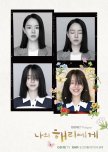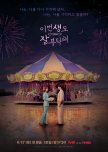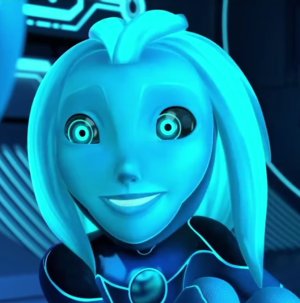
To my Haesun / Dear Hye-Sun
***Final Update (from October 30th, 2024)***The last four episodes don’t hold back on beautiful performances. Since I don’t want to spoil the story, I’ll only offer temporal hints.
Not only the actors but also the director and the cinematographer do their work masterfully. At the 30th minute of episode 10, seeing the frame where three men sit almost as if in a storefront—each in his own display frame—Quentin Tarantino’s name comes to mind. The presentation continues to be artfully executed.
From here, in episode 10, right through to the end, the story is imbued with deep emotions, and Shin Hye-Sun proves herself to be one of the best of her generation. This is especially evident in the 63rd-minute uncut scene, with two tears rolling down at the end. This is not a light drama.
For those who grasp its message, this drama will be deeply cherished. It’s not toxic. It’s melancholic, beautiful, and sad, but ultimately, it is soul-healing. Why? That’s the very philosophy of the work—Hyeri embodies the essence of a fleeting, brilliant phenomenon...
*** Update from October 18th, 2024 (before watching the 9th episode)
The eighth episode is a quiet one...
... a quiet episode...
If the eighth episode were a film, it would be an Oscar-winning one. Shin Hye-Sun's performance is outstanding, as are the others’. The director's work, the way the cinematographer captured the scenes, and how the sound engineer almost plays with the sounds — all of it is artistic and masterful.
... a quiet episode.
*** Update from October 12th, 2024:
I am adding this to my review after watching the sixth episode (and before watching the seventh). The film's title, To My Harry / Dear Hye-Ri (with many variations due to the multiple transliterations of the Korean title), is slowly beginning to reveal its possible meaning, and after the sixth episode, that meaning fills me with a bit of dread. It seems the title is the beginning of a message written to Hye-Ri. What fills me with dread is what that message will turn out to be. (So far, the title hasn’t revealed much, much like the title of Umberto Eco’s film-adapted novel, The Name of the Rose.) As for the rest of the review, nothing needs to be changed yet. The characters continue to wonderfully unravel the threads of the story.
*** End of the Update
Obviously, after watching only the first four episodes, it's difficult
to give an exhaustive review. However, the series has had a very
strong start. The story is already dynamic from the very first
episode. The screenwriter (Han Ga-Ram) avoided the mistake of
giving the series a tedious and drawn-out introduction.
The director (Jung Ji-Hyun) executed this well. The beginning of the first episode shows just enough to put the viewer in a clear position of understanding.
The story constantly holds surprises. The screenwriter doesn’t
resort to cheap solutions, making the narrative engaging and
smooth.
As expected, Shin Hye-Sun’s performance is reassuring and
brilliant. Her portrayal of the dual personality (Joo Eun-Ho / Joo
Hye-Ri) beautifully and subtly echoes her past successful roles (My Golden Life, Mr. Queen, See You in My 19th Life). Hye-Sun creates a wonderful and very enjoyable atmosphere... together with the
others like Kang Hoon, Jo Hye Joo, Lee Jin Uk, and the rest, though I won’t list them all here. They mutually and advantageously
complement each other’s roles.
We haven't yet had a behind-the-scenes look, but as is
characteristic of Shin Hye-Sun’s dramas, Dear Hyeri is marked by
beautiful visual solutions, subtle gestures, and their perfect timing. Shin Hye-Sun reveals these gestures in the most sensual moments
to the viewers – or perhaps it’s the other way around, where these delicate gestures create the enchanting moments.
Right from the start, they tell the viewers, 'This is not a love story.'
However, the viewer might still hold on to some hope, as the scenes between Hye-Ri and Ju-Yeon (Kang Hoon) are delightful (and at the same time, there’s so much uncertainty vibrating in the background – the fragility of the budding relationship is almost palpable).
Jung Hyun-O (Lee Jin-Uk) is, to say the least, an unpleasant character, and thus a difficult role. He’s not exactly likable, but he represents the darker side of events. Strangely enough, he does have some likeable moments, though the viewer might prefer to dismiss him. As uncomfortable as Jung Hyun-O may be, he is necessary; without him, the entire story would lose some of its captivating power and wouldn’t be believable.
It’s clear that Shin Hye-Sun’s role is the current that drives the
events forward, and we can’t yet see how the dual personalities will battle or assist each other. Hye-Ri’s conversation with her
psychiatrist at the end of the fourth episode is heart-wrenching.
And as she tries to communicate with her other self in an effort to
protect herself (Hye-Ri). The dual personality of Joo Eun-Ho / Joo
Hye-Ri is very different. While Eun-Ho is well-defined and
purposeful, Hye-Ri’s boundaries are blurred, and she is a vibrant,
colorful personality with surprisingly sharp insights and direct
solutions.
I’m already looking forward to the continuation... and I’m also
worried, because if the introduction is to be taken seriously [‘This is not a love story’], many heart-wrenching events are still to come.
Aja
Was this review helpful to you?

This review may contain spoilers
Eve, the Ezer Who Remembered the Garden
When the Stars Gossip (별들에게 물어봐)Revised Review
This drama, which is a tragedy, is one of the most moving and most beautiful love dramas I have ever seen. I phrase it cautiously only because it might sound like flattery if I were to call it the best.
In the non-Christian world—such as the Far East (with the exception of the Philippines and South Korea)—the story can easily be misunderstood. Yet even within the Christian world, only a few people know the Bible well, or know it in the way from which this drama draws its foundation.
At the end of this review, the necessary background information can be found.
Today, January 4, I am celebrating a double anniversary.
This was the day of When the Stars Gossip’s global premiere on Netflix. (Although I believe it may actually have been a day later—but this is how I remember it.)
Screenwriter Seo Sook-Hyang approached this subject with remarkable courage. I would be very curious to know who assisted her with the background research.
To the average viewer, Commander Eve Kim appears to be ambitious, driven, and so on—yet these are all misunderstandings. The lack of background knowledge dictates this reading.
The Drama (with a capital D), When the Stars Gossip (WSG), grows out of the founding tragedy of Hebrew and Western culture. It originates in the Book of Creation, Genesis. It is a deeply considered, masterfully executed drama woven through with Hebrew and Christian symbolism.
Consider, for example, the entirety of the ending of Episode 1:
the floating scissors marked with the number 13 [Ep01 – 1:11:13—where even the timing focuses on 13],
the apple scene [Ep01 – 1:13:00], and once again the number 13.
A disturbing duality appears here. In Hebrew culture, 13 is not ominous at all; on the contrary, it is a positive number, signifying transformation. In Christian culture, however, it is associated with misfortune. In WSG, both meanings are present: transformation and pain, turning point and tragedy.
The acting performances are flawless, are excellent. The musical world of the drama is perfect, the cinematography meticulous in every detail, and the computer-generated work likewise reflects outstanding direction.
Now, a brief reminder from the portion of Genesis concerning humanity.
Human beings are expelled from Eden because they eat from the Tree of Knowledge before its appointed time (the Lord did, in fact, intend the Tree of Knowledge for humanity). The serpent disrupted the order.
So that humanity would not also eat from the Tree of Life—and thus force the Lord to destroy them—the Lord expels them from the Garden of Eden.
Yet the Lord does not give up. He chooses another path to fulfill His plan—and this is what the rest of the Bible, and our own lives, are about.
What would have awaited humanity before the Tree of Knowledge? Genesis does not describe this. However, if we look at the rest of the Bible, we can perceive that it would have been connected to love, truth, and respect for life.
This is what should have been part of humanity—this is all we know.
This outlines, in broad strokes, the Drama.
Seo Sook-Hyang lays out three main narrative threads.
The first is Commander Eve’s. Through the trials of life, she carries within herself the essence of all three values—love, truth, and respect for life (of course, she is human, profoundly human, capable of error like anyone else). The details of Eve’s actions reveal that this is not ambition. She says to Ryong in her self-revealing confession:
“Do you think that if it hadn’t been about you, I would have jumped into space as a commander just because you were left alone? Do you really think I’m that righteous and ambitious?” [Ep.11 – 56:30]
The second thread belongs to Ryong, who could rival Eve if he had not been drawn onto the path of power and wealth.
Power, Laurel, and Money tend to suffocate love, truth, and respect for life whenever these values fail to serve their goals.
The third thread is that of human weakness. It includes both the powerful and the powerless. Alongside Eve’s and Ryong’s story, this thread takes the form of a strong parody. The chaos surrounding the lottery ticket, the violent attempt to preserve the inheritance line, and Eve’s mother’s self-justification [Ep13 – 46:30] all belong to this same parody—sometimes with a bitter aftertaste.
Every episode features beautiful scenes and strong dialogues, which makes every part of the series deeply enjoyable. One such scene is when Eve (Kong Hyo-Jin) and Go-Eun (Han Ji-Eun) drink together, and Go-Eun tries to use her money and power to push Eve away from Ryong. Yet Eve’s outwardly confident reply—despite her clearly felt inner unease—reveals the true value:
“I don’t give a damn [about what you’re saying]. Do you think I’m a boring woman?” [Ep12 – 11:30]
Her inner tension, however, is revealed by the fact that she goes along with the drinking—she wants to prove something.
The pacing of the series is dynamic; there are no yawning episodes.
Love is such a simple word, and yet so deeply misunderstood. Park Dong-A (Kim Ju-Hun), kneeling, confesses his infidelity and asks Eve for forgiveness [Ep10 – 31:30]. This has nothing to do with love or respect. Dong-A’s apology is meant only to ease his own conscience, not Eve’s (he does not know that Eve already knows about his infidelity; if she did not, his confession at that moment would have been a cruel injury). The same applies to their breakup in the café. Eve cannot be blackmailed [Ep11 – 27:25].
Seo Sook-Hyang deliberately concentrates the strongest dialogues primarily around Eve and Ryong, so that the contrast between the narrative threads has a powerful emotional effect on the viewer. Her solutions are subtle and sensitive. Eve immediately defuses Ryong’s words as they begin to turn hurtful:
“The ultrasound… what is this? Why did you send it to Yi-Man (Im Sung-Jae)?”
Yet Eve instantly moves to the essence, avoiding conflict and trusting Ryong’s character:
“Is it okay that the baby’s heart is beating so fast?” [Ep.16 – 2:00]
Eve’s acts of sacrifice may go further than they should. One example is the ramen scene in front of the hospital, where she deliberately trivializes what happened so that Ryong can be angry with her—making the breakup easier for him [Ep.10 – 55:00].
The same is true of her meeting with her mother, her taking responsibility for the destruction of the blackberry sprout, and so on.
The first woman of the Hebrew Bible, Ezer, echoes through these scenes—God’s gift, the Companion, the First among the protectors.
She takes it upon herself to eat the fruit of the Tree of Knowledge in order to obtain an answer to the serpent’s deceit. If Ezer dies, Adam will know that he must not eat from the tree, that the prohibition is real.
And although people read many different things into the Bible, the Lord knows that Ezer (later named Eve) is the least guilty.
She did what she was created to do—she protected her companion.
A short passage from Genesis is highly revealing.
The Lord curses the serpent at great length. He does not curse Adam personally, but reproaches him almost as long as the serpent, and curses the ground Adam will cultivate.
Only the part addressed to Ezer (Eve) is brief and factual. He does not curse, he does not scold; he states:
'I will make your pains in childbearing very severe;
with painful labor you will give birth to children.
Your desire will be for your husband,
and he will rule over you.”
It must be understood that the Lord never evades responsibility. Events unfold according to His will. He does not say, “A stone will fall on your foot and you will limp,” but rather, “I will make you limp.” From this perspective, what He says to Ezer (Eve) is a statement of consequences—what follows from eating from the Tree of Knowledge too early.
Thus it now reads as follows:
The pains of your childbearing will be very severe;
with painful labor you will give birth to children.
Your desire will be for your husband,
and he will rule over you..
Although this still does not reveal the Lord’s original plan, it does reveal what would have been prevented: that the husband would not seek to dominate his female companion, that he would not prioritize his own interests above all else, that he would not exploit her desire for him. (This also applies to human relationships in general.)
In this drama, Eve breaks this fate (the transformative meaning of the number 13). Ryong accepts his fate as her companion and goes up into space after Eve to bring her back to Earth. But the powers above do not let Eve go. Thus, the drama ends above, in space (the ominous interpretation of the number 13).
Everyone has experienced moments when events unfold in a seemingly fated way. Because of this, the viewer is able to feel this sense of inevitability.
Our personal experiences are, of course, far less tragic—but they can still be shocking when coincidental events align into a single coherent picture. This is why the dramatic turn in this story has such a powerful impact.
I thank everyone who made it possible for me to see this drama.
And I also thank those who were patient enough to listen all the way through.
BACKGROUND BIBLICAL INFORMATIONS
Here, I only share a few reflections that may help some viewers recognize the deeper message of the drama.
In the Hebrew Bible, the myth of the “founding tragedy” ends with humanity’s expulsion from Eden. By disobeying a divine command and eating from the Tree of Knowledge, humanity enters the drama of the world and its own history.
Writer Seo Sook Hyang boldly takes up this theme, and her interpretation likely resonates with modern theological understandings of the Bible. She rehabilitates the biblical first woman through the actions of her distant descendant, Kim Eve—a commander with an inquisitive gaze and deep respect for life, played by Gong Hyo-Jin.
Seo Sook Hyang almost certainly drew inspiration from the Bible’s original description of the first woman. Eve only receives her name after the expulsion. Before that, the Bible refers to her as ezer kenegdo—“a helper fit for him,” or more precisely: “a divine companion given to man.” The meaning of ezer is crucial:
ezer – a gift from God; equal (partner); first among protectors.
This casts the first woman in an entirely new light. She is God’s favorite, assigned to stand beside Adam. Her “sin” is not desiring the fruit of the Tree under the serpent’s influence, but rather protecting Adam from temptation.
Eve believes they must not eat nor even touch the tree, or they will die. The serpent says: “You will not die.”
[This contradiction might arise from the fact that the command was given to Adam before Eve was created, which may explain the miscommunication.]
Eve, as ezer, the first among protectors, resolves this paradox. The Bible simply says of her thoughts: “She saw that the fruit was good, desirable, and would grant knowledge.”
And so, as ezer, she eats first. If she dies, Adam will know the serpent lied. Only afterward does Adam knowingly eat the fruit.
Once humanity is expelled from Eden, the question remains: Does humankind possess the capacity to handle knowledge without destroying itself?
This is a sharply relevant question today—atomic weapons, artificial intelligence, genetic engineering, environmental crisis, the sanctity of life… These are all forms of knowledge not always accompanied by moral maturity.
The drama echoes with this very question.
It’s worth noting the director’s use of grotesque sequences—absurd quarrels over lottery tickets, the obsession of MZ’s leader, and nearly theatrical mise-en-scène.
Even in seemingly minor details, this grotesque humor emerges. The leader assures everyone that a mini-storage unit will protect a mulberry sprout from all “unknown radiation.” The absurdity lies in the phrase itself—“unknown” radiation is, by definition, something we don’t understand (and might not even be aware of). If I were in the leader’s place, I’d find it far more reassuring if the sprout were protected from known harmful radiation.
God loves the righteous. Whoever seeks truth is seeking God, and such a person dwells close to God. To their eyes, the actions of the deceitful seem grotesque.
God is love. One of the most quoted declarations of love in Christian tradition is from Paul’s First Letter to the Corinthians (Chapter 13), which essentially says:
You may be crowned with glory, power, and wealth—but if you have no love, you have nothing. And the opposite is true:
You may be poor and possess nothing, but if love resides in your heart, you have everything.
Grotesqueness, then, is a form of judgment.
Eve is never depicted grotesquely—on the contrary, she serves as the contrast.
In this light, Christian culture often returns to a haunting question: Why does God allow the righteous, the innocent, to die? Where is the justice in that?
If this question doesn’t arise naturally in the viewer’s mind, Ryon raises it, quoting Eve: “She jokingly said that I should die instead of her.”
A possible answer is offered in a brief, emotional one-minute short story: Paulo Coelho’s The Two Jewels
[https://paulocoelhoblog.com/2017/10/09/the-two-jewels/]
Or in the Book of Wisdom 4:7–15 (excerpt):
“The righteous, though they die early, shall be at rest. For old age is not honored for length of time, or measured by number of years… Their soul being pleasing to the Lord, He took them quickly from the midst of wickedness.”
There is no better place for a person than beside the Lord.
Eve, the ezer, is only temporarily on Earth. God wants His beloved by His side. He does not let her suffer any longer.
In the final scene, we see Ryon in a wheelchair on the beach, filmed from behind.
From behind the camera’s point of view, a little girl runs into the frame, followed by a tall, radiant woman—
As if the Lord Himself were offering comfort:
“I have not forgotten you either. When your time comes, I will send them for you.”
This drama must be seen. Whether or not it breaks viewership records is irrelevant.
I’ve avoided describing the emotional or heartbreaking moments—let everyone discover those for themselves.
Aba
Was this review helpful to you?

"Have you fallen in love?"
Why do children love fairy tales? Because they are stories where there’s no logic, yet they are still stories. The best stories are written by life, and they are the best because the events shouldn’t have unfolded the way they did. Yet they did, and they unfolded in a magical, fairy tale-like way.
The drama "See You in My 19th Life" is also a fairy tale—one for adults. It’s a Rom-Com, a romantic comedy. The execution is brilliant. It’s not forceful, yet it’s full of deep emotions—happy, sad, and touching ones. Perhaps that’s why it touches the soul like a balm.
I won’t go into details about the plot, so that those who haven’t seen it can fully enjoy it. The beginning is lighthearted, and the rest remains a secret for those who haven't watched it yet.
This series starts off dynamically from the very first episode, immediately captivating the viewer. I’ll tell you this: you’ll likely want to watch it twice. On the first viewing, the solutions might seem surprising, even exaggerated. However, the actors charmingly portray the dilemmas of ordinary life. What initially feels overdone turns out to be the drama’s redeeming philosophy. This is what truly drives the story, and understanding this will prompt you to watch it again. Upon a second viewing, something strange happens. It’s as if the series was shot from two different camera angles. From the second perspective, the solutions no longer seem exaggerated—they’re the best they could be. The actors convey this brilliantly on screen.
Shin Hye-Sun delivers a stellar performance. Her choice of hair color (a fox-like hue) beautifully complements the cunning character she plays—both as an actress and as a person interacting with Mun Seo-Ha (Ahn Bo-Hyun, who excellently portrays a young man tormented by memories of the past). The playfulness is not one of malice, but rather a loving attempt to get closer to him.
In almost every episode, we’re treated to beautiful, emotionally stirring visual solutions. Ban Ji-Eum (Hye-Sun) plays with her voice sensually when she believes that Seo-Ha, her young friend from a past life, can’t hear her. Ji-Eum, who remembers her past lives, affects those around her like someone blessed with an extraordinary level of empathy. And this is where the others in the story come in. The cast complements each other wonderfully. Ha Yoon-Kyung’s performance as Cho-Woon must be mentioned. She’s incredibly likable, and in several scenes, she conveys emotions from the screen with a powerful intensity. A great choice to pair with Shin Hye-Sun.
The director and the entire crew deserve praise. There are many beautiful solutions in the series, but as promised, I won’t spoil them—let them surprise you. Both in terms of content and visuals.
The child actors also shine in the series. They gave excellent performances, which was also highlighted by professional critics.
The film’s OST is romantic and wonderful.
The only negative I’d point out is the rushed ending. I was horrified when I realized I was suddenly watching the last episode. From that moment on, I was counting the minutes (only ten left, only five left...). This team could have elegantly resolved everything in an extra 30 minutes, rather than cramming it into just 15. It was too fast, with no time for the gentle unraveling that had characterized the entire series.
But who would I dock points for this? To be fair, no one.
Aja
Was this review helpful to you?





